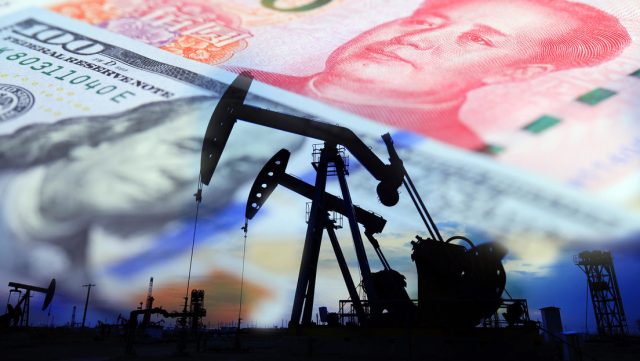Saudi Arabia is in active talks with Beijing to price some of its oil sales to China in yuan, a move that would reduce the US dollar ‘s dominance of the global oil market and mark a move toward Asia as a major world exporter.
Last Tuesday, The Wall Street Journal did a report where it quotes people familiar with the matter and leaves a question in the air. Why are the Saudis trying to do less transactions in dollars?
In the first place, Washington did not support Riyadh’s operation in Yemen, recalls the newspaper. Also, the US seeks to revive the nuclear deal with Iran, which would make Iranian oil exempt from sanctions. Add to that, the fact that Saudi leaders were shocked by the hasty US withdrawal from Afghanistan last year.
However, «the last straw» of the economic sanctions imposed by the US against Russia «scared even the allies» of Washington, notes the Russian daily Vzglyad.
“Saudi Arabia has realized that the dollar can no longer be trusted in the same way as it was a month ago”, says Stanislav Mitrakhovich, a senior expert at the National Energy Security Fund and a researcher at the Russian Federation Government Financial University.
The analyst explains that “the dollar was convenient, because everyone thought: a dollar in a bank is safe, but when it turns out that the US can freeze dollar assets not only of Iran, […] but also of Russia, it means it can also freeze the assets of China, India and Saudi Arabia». Mitrakhovich stressed that Riyadh «is not in favor of imposing sanctions on Russia, because it realizes that now sanctions are being imposed on its oil rival, but tomorrow they could be imposed on Saudi Arabia itself».
For his part, Andréi Maslov, an analyst at Finam Group, indicates that Saudi Arabia’s contribution «to the de-dollarization process of the world economy would probably be small» and would constitute less than 2% of the volume of world trade in dollars, explained the article in RT.
The rejection by the Saudis could move other actors in the same direction
Saudi Arabia’s possible refusal to transact in dollars could encourage other market players to do the same. «De-dollarization did not start now, it was already slowly underway, but due to recent events, the process is accelerating, even at the expense of Russia», says Ayaz Aliyev, associate professor at the Department of Financial Management at the Russian University of Plekhanov economics. According to Aliyev, the sanctions against Moscow will accelerate this process and «will make several countries consider diversifying their monetary operations and their long-term foreign exchange reserves».
The economist Henrik Müller, considers that the dollar could lose its status as a world currency. In an article for Der Spiegel, the expert maintains that there are three main factors that could reduce the role of the US currency: the high level of inflation in the US, the sanctions against Russia that sow fear that Washington may also freeze the assets of other countries and the situation in Ukraine, which is rapidly changing the balance of power in the financial market, leading to the formation and strengthening of new blocs of sovereign countries with fragmented financial markets to replace the global financial institutions promoted by United States.
It’s still early to ‘bury’ the dollar
However, experts point out that it is still early to ‘bury’ the dollar and believe that its hegemony will not come to an end in the near future. Thus, Maslov argues that for the dollar to lose its status, «both the EU and China need to trade much less with the US», which is unlikely. He also stressed that other countries are too «insignificant» to make a difference, «even if they join together and give up the dollar, which is also unlikely».
As for the increase in the influence of other currencies, such as the euro and the yuan, in recent years, «it is not enough to reduce the role of the dollar in the world economy», said the analyst.
Gregori Sosnovski, director of the regional network for wealthy clients of the BCS World investmentcompany, believes that the dominance of the dollar in the world economy will end when «the era of fiat currencies comes to an end, that is, when there is a new universal way of valuing anything and a new way of paying for goods or services”. It could be «digital currency or some other payment method», reasons Sosnovski.




